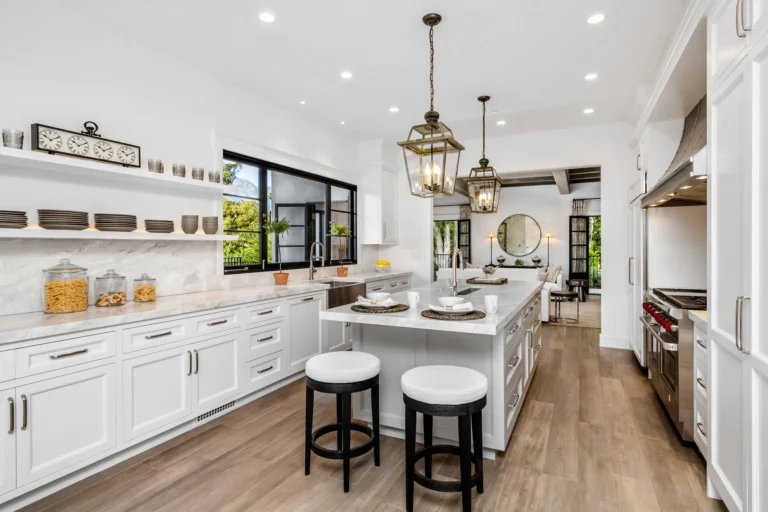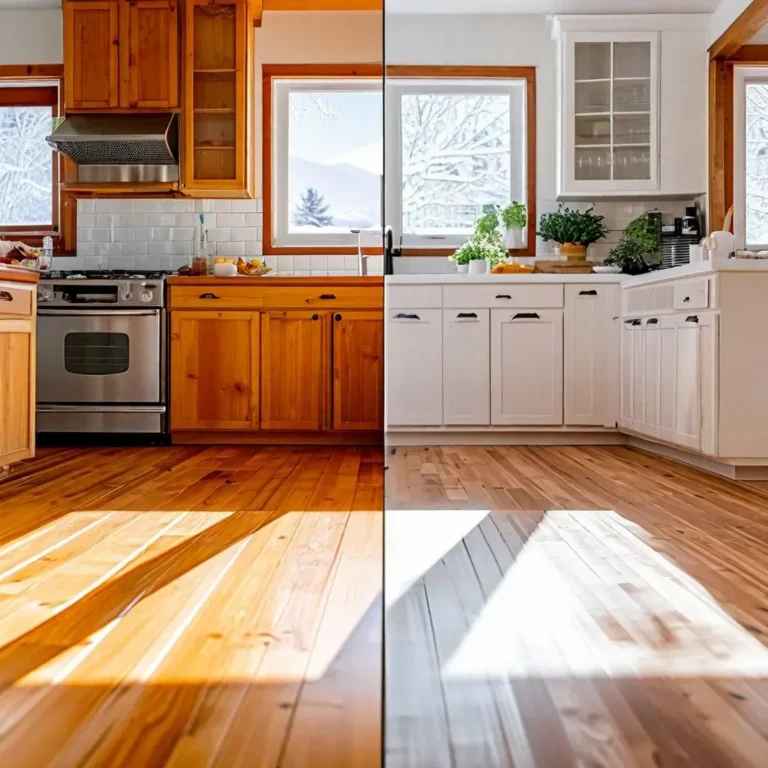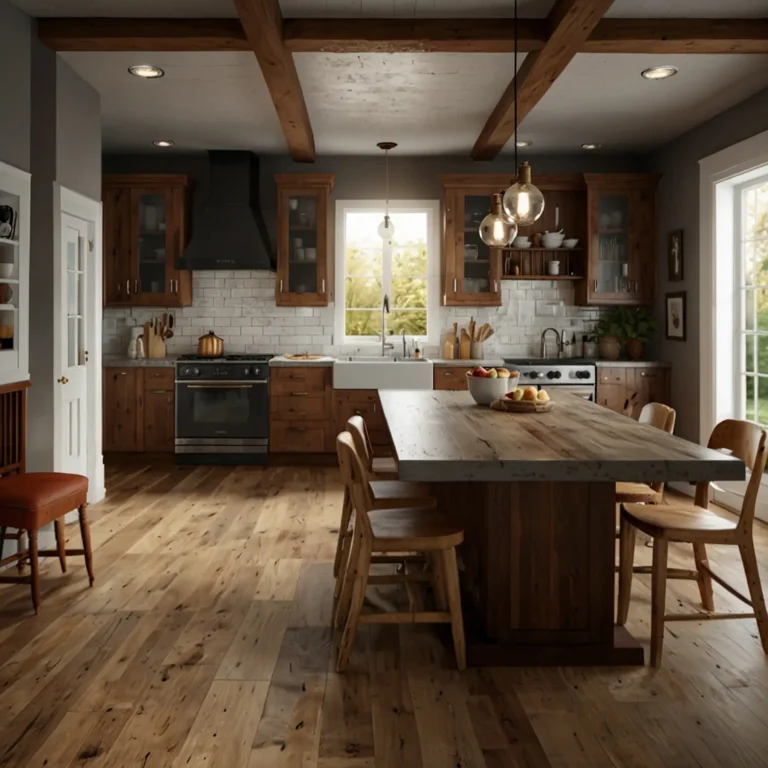Best Wood Flooring for Colorado Kitchens: Complete 2025 Guide

Engineered hardwood flooring is the definitive best choice for Colorado kitchens, offering superior moisture resistance and dimensional stability in our state’s challenging low-humidity climate (10-25% vs. NWFA ideal 30-50%). Top-performing species include white oak engineered flooring (Janka 1,360), hard maple, and hickory engineered planks – all scientifically proven to withstand Colorado’s extreme temperature fluctuations and high-altitude UV exposure.
2025 Denver Market Insight
With kitchen remodeling costs in Denver ranging $50,000-$100,000 and the city’s housing shortage driving comprehensive renovations, choosing climate-appropriate flooring is critical for protecting your investment in Colorado’s competitive real estate market.
🎯 FREE Kitchen Flooring Consultation - Denver Metro
Why Wood Flooring in Kitchens is Challenging in Colorado

Colorado Climate Science: The Hygroscopic Challenge
Colorado’s unique high-altitude environment creates specific challenges for kitchen wood flooring that must be scientifically understood:
Critical Climate Factors:
- Extreme dryness: Relative humidity of 10-25% (vs. NWFA recommended 30-50%)
- Hygroscopic wood behavior: Wood naturally absorbs and releases moisture to achieve Equilibrium Moisture Content (EMC)
- Temperature swings: 40-60°F daily variations stress wood fibers
- UV exposure: 25% more intense at Denver’s 5,280+ ft altitude
- Seasonal extremes: Winter heating drops humidity below 20%, causing wood contraction
The Denver Market Reality: Why Flooring Choice Matters
Market Analysis 2025:
- Denver kitchen remodels: $50,000-$100,000 average investment
- Boulder market premium: $60,000-$120,000+ due to sustainability focus
- Housing shortage catalyst: Buyers acquiring “fixer-uppers” drive comprehensive renovations
- ROI significance: Kitchen flooring represents 15-25% of total remodel budget
Expert insight: “Wood is a hygroscopic material, meaning it will take on or give off moisture according to the environment it is placed in. In Colorado we can observe indoor relative humidity fluctuate between 30-45% in warmer months to below 20% in winter.” – NWFA Certified Colorado Contractor
The consequence: Improper wood selection leads to visible gaps between floorboards, checking (surface cracks), and potential structural warping – expensive failures in high-investment Denver kitchens.
Top 3 Wood Flooring Types for Colorado Kitchens

1. Engineered Hardwood Flooring ⭐ BEST CHOICE
Why engineered wood wins in Colorado kitchens:
- Superior dimensional stability in low-humidity environments
- Multi-layer construction resists warping and cupping
- Moisture-resistant adhesives between layers
- Compatible with radiant heat systems
- No job site acclimation required
Top engineered species for Colorado kitchens:
- Oak engineered hardwood: Classic appeal, 1,360 Janka rating
- Maple engineered flooring: Clean look, 1,450 hardness
- Hickory engineered planks: Distinctive grain, 1,820 hardness (hardest domestic wood)
Cost: $7-15 per square foot installed
2. Solid Hardwood Flooring ⚠️ COLORADO CONSIDERATIONS
Solid wood advantages:
- Authentic hardwood appeal and warmth
- Multiple refinishing cycles (up to 10 times)
- Timeless investment value
- Premium feel underfoot
Colorado-specific challenges:
- Extreme gapping in winter months (normal seasonal movement)
- Requires whole-house humidification (25-40% RH mandatory)
- Higher maintenance in dry climate
- Professional installation crucial for proper acclimation
3. Luxury Vinyl Plank (LVP) 💧 MOISTURE CHAMPION
LVP benefits for Colorado kitchens:
- 100% waterproof core construction
- Zero humidity concerns – performs in any climate
- Realistic wood appearance with advanced printing
- Comfortable underfoot vs. tile options
- DIY-friendly installation
Considerations: Lower resale value impact vs. real wood
Colorado Kitchen Wood Species Guide: Scientific Selection
| Species | Shrinkage Rate | Gap Formation Risk | Recommended Format | 2025 Design Alignment |
|---|---|---|---|---|
| White Oak | Low (2.8%) | Minimal | Solid/Engineered | Perfect – Light trend |
| Hard Maple | Low (3.7%) | Low | Solid/Engineered | Excellent – Clean lines |
| Hickory | Medium (4.9%) | Moderate | Engineered Only | Good – Rustic luxury |
| Douglas Fir | Very Low (2.4%) | Minimal | Solid Preferred | Excellent – Local theme |
For Colorado kitchens, scientific species selection is based on dimensional stability and resistance to low humidity characteristic of the state. White Oak emerges as the superior choice due to its closed-cell structure that resists moisture absorption and its low shrinkage rate (2.8%) in dry environments, making it perfect for Colorado’s extreme conditions where relative humidity fluctuates between 10-25%. Hard Maple offers an excellent alternative with its tight grain pattern that minimizes dirt accumulation in kitchens, while its naturally light color reflects Colorado’s intense sunlight and aligns perfectly with 2025 design trends toward natural tones and the “quiet luxury” philosophy.
Hickory, being the hardest domestic species available, provides superior scratch resistance for pet-friendly homes, though its higher reactivity to humidity changes requires exclusively engineered format in Colorado. Finally, Douglas Fir represents a unique option with exceptional stability (2.4% shrinkage) that exceeds expectations for its relative hardness, offering reddish-brown tones that perfectly complement Colorado’s mountain design themes, plus being a sustainable choice that supports the local forestry industry. The key to success in Colorado lies in understanding wood’s hygroscopic behavior and selecting species that maintain dimensional stability in the state’s arid climate, thereby avoiding costly problems like visible gaps, surface checking, and structural warping.
PERSONALIZED WOOD SPECIES SELECTION + COMPLETE KITCHEN REMODELING
Not sure which wood species is right for YOUR Colorado kitchen? Planning a complete kitchen transformation? Our experts provide comprehensive services from species selection to full kitchen remodeling
Critical Colorado Installation Considerations
Humidity Control: Non-Negotiable in Colorado
“The National Wood Flooring Association recommends keeping your Colorado home’s relative humidity levels between 25-40% continually, year-round, to help protect the woodwork in your home.”
Essential requirements:
- Whole-house humidifier mandatory for solid wood
- Humidity monitoring with thermo-hygrometer
- Year-round operation (even summers are dry in Colorado)
- Professional moisture content testing before installation
Finish Selection for Colorado Kitchens
Recommended finishes for Colorado conditions:
- Catalyzed water-based polyurethane: Superior moisture resistance
- Moisture-cured urethane: Maximum durability for kitchen use
- UV-cured finishes: Enhanced traffic resistance
- Penetrating oil finishes: More conditioning for dry climate.
Professional Consensus
Most Colorado flooring contractors recommend: Engineered hardwood for kitchens due to moisture exposure combined with state’s challenging climate, reserving solid wood for lower-risk areas like bedrooms and living rooms.
🔧PROFESSIONAL WOOD FLOOR INSTALLATION – DENVER
Ready to make the solid vs. engineered decision? Our certified hardwood flooring installers bring 15+ years of Colorado experience to ensure perfect results regardless of your choice.